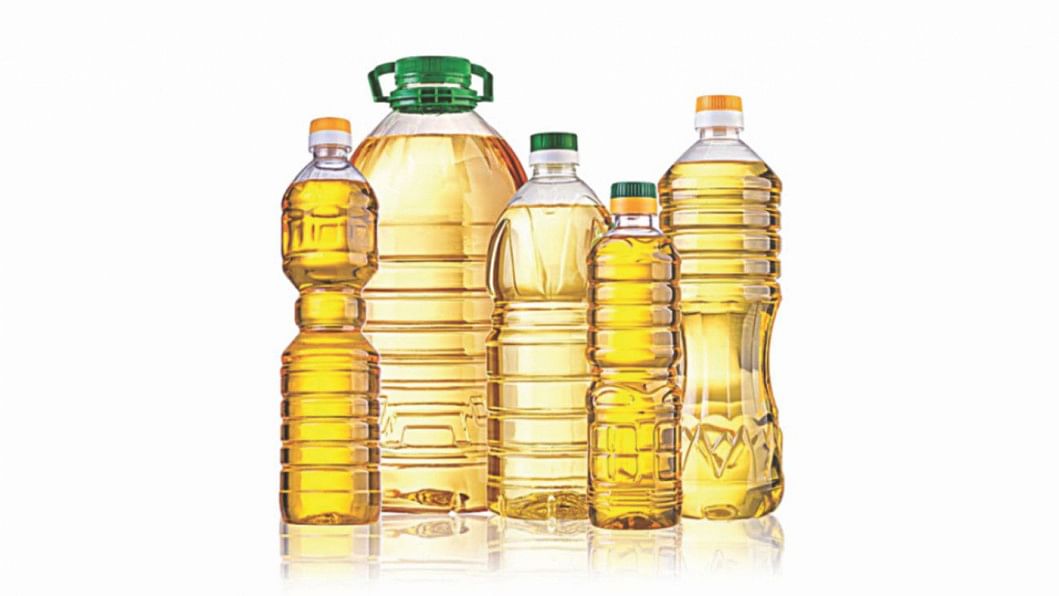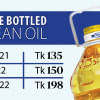Edible oil prices rise in spite of VAT cut

Consumers in Bangladesh saw no drop in soybean and palm oil prices over the past week even though the National Board of Revenue (NBR) has reduced an import VAT from 15 percent to 10 percent.
On October 17, the NBR also exempted VAT at the production and trading stages of the commodity, which is mostly imported. It said the VAT benefit would remain effective until December 15 this year.
The move came at a time when inflation has been hovering over 9 percent since March 2023. Food inflation has remained above 10 percent since April this year.
Despite the VAT rate cut, prices of unpackaged palm oil, which is consumed the most, stood at Tk 148 to Tk 149 per litre today, up 0.34 percent from that a week ago.
Meanwhile, prices of unpackaged soybean oil rose 2 percent to Tk 155 to Tk 160 per litre at retail in Dhaka city, according to data of the Trading Corporation of Bangladesh.
The current prices are also higher from that a month and a year ago.
"Spiralling prices of palm oil is driving the rates of other edible oil. Exporting countries are focusing on making biodiesel using palm oil," said a top official of a leading commodity importer and processor.
The official urged the government to reduce VAT on the import of both palm and soybean oil to 5 percent to contain domestic prices.
The World Bank, in its latest commodities price data, said palm oil prices soared 9 percent to $937 per tonne in the July-September quarter this year from $856 a year ago.
A report by Malay Mail said a supply shortfall from Indonesia, the world's largest palm oil producer, was a factor behind the spike in prices in the international market.
In September 2024, Indonesian exports dropped to 1.79 million tonnes from 2.38 million tonnes in August and 2.28 million tonnes a year earlier.
This decline in exports has been linked to the impact of the 2023-2024 El Niño, which affected palm fruit yields, as highlighted by Indonesian Palm Oil Association (GAPKI).
In the first eight months of 2024, Indonesia's production fell to 34.52 million tonnes from 36.29 million tonnes in the same period in 2023, it added.
In a report on October 9, Reuters quoted a leading industry analyst as saying on Tuesday that implementation of higher biodiesel mandates in Indonesia was likely to tighten supplies of the vegetable oil.
Indonesia currently has a mandatory 35 percent blend of palm oil-based fuel in biodiesel and is seeking to ramp up to biodiesel containing 40 percent palm oil to cut its energy imports.
The plan, if implemented, could see a rise in biodiesel consumption to 16 million kilolitres next year.
The move would involve the additional use of 1.5 to 1.7 million tonnes of palm oil, leading to lower export volumes, Oil World senior analyst David Mielke told a palm oil conference in Kuala Lumpur, according to Reuters.
Abul Hashem, general secretary of Bangladesh Edible Oil Wholesalers Association, said there was no effect of the VAT reduction on the prices of edible oil in the domestic market.
Prices of both palm and soybean oil rose by Tk 200-Tk 250 per maund over the last one week, he added.
"Supply is short of demand," he said.
The US Department of Agriculture forecasted that Bangladesh's consumption of vegetable oil would be 32 lakh tonnes in marketing year 2024-25, which began this month, up from 31 lakh tonnes in the previous year.
Palm oil accounts for almost half of the nation's total domestic consumption while soybean oil is roughly one-third. The types of vegetable oil include coconut, olive, palm, palm kernel, rapeseed, soybean, and sunflower seed oil.
Bangladesh meets more than 80 percent of the vegetable oil requirement through imports.

 For all latest news, follow The Daily Star's Google News channel.
For all latest news, follow The Daily Star's Google News channel. 










Comments